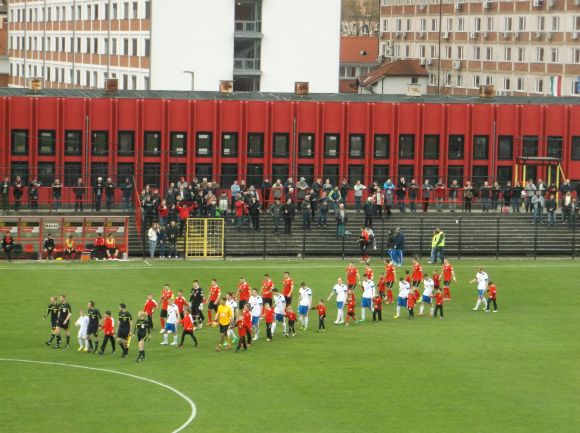Older Manchester United fans may remember Pécs, then Pécsi Munkás, who provided the club’s first European opposition post-Heysel. Despite grave financial uncertainty, Pécs are now challenging for Europe again thanks to a dynamic young side. On the eve of their game at champions elect Debrecen, Peterjon Cresswell visits the club based in the Socialist-era surroundings of Uranium City.
Pécs probably wouldn’t be your first choice to provide a feel-good story about Hungarian football.
Debrecen, Györ and Ferencváros all have new or recently built stadiums, and 38 titles between them. Given Debrecen’s currently strong lead, that will almost certainly run to 39 this May.
Pécs, their modest, roof-free stadium surrounded by the Socialist-Realist tower blocks of Uranium City, last made the headlines at Christmas when their owner gave the shock announcement that he was pulling out.
Dezsö Matyi, who built his empire on books and wine, chose his flagship store on Budapest’s elegant Andrássy út to drop the bombshell at an extraordinary press conference.
All winter, Pécs stayed on the sports pages. Can the club survive? How? For how long?
Though none of these questions can yet be answered, reports of the club’s demise seem to have been greatly exaggerated.
This Saturday, champions elect Debrecen host Pécs, aka PMFC, aka the Cinderella story so far of the 2013-14 season. Two weeks ago, PMFC travelled to challenge the current champions of Hungary, Györ. This fresh, dynamic, young team literally played them off the park in a 5-2 win. ‘The champions saw a lesson in football’, read the headline in ‘Nemzeti Sport’ the next morning, and they were given it by a group of youngsters who never stopped running, passing or moving into space. They’ve been doing this all season – it’s just only now beginning to come off.
Under ex-Pécs coach Gábor Márton, midfielders Róbert Kövári and Dávid Márkvárt, 18 and 19 respectively, have the confidence to show their worth. After the Györ game, Pécs manager Emil Lörincz – the popular Márton has the dressing room, Lörincz the UEFA licence – said: ‘That was our aim when we started, to build a team that the fans could love, whose results match the football they played. For that we need a certain mentality that this kind of game requires’.
Raised in nearby Szekszárd, Kövári and Márkvárt can count on the defensive mettle of Pécs-born Ferenc Fodor, 22, and Croatian Danijel Romic, 21, as well as the experience of Pécs-born midfielder Krisztián Koller. Attacking thrust is also provided by Lóránd Szatmári, who started his career at Pécs.
Fittingly, their next victims were MTK, whose veteran coach József Garami, now a decade in charge, began his managerial career at Pécs. Under Garami, Pécs enjoyed their glory years, league runners-up in 1986, cup winners in 1990, both with Gábor Márton in the midfield. PMFC’s only silverware to date allowed them to provide Manchester United (English clubs, in fact) with their first European opposition since Heysel.
That October, 17,000 squeezed into the PMFC Stadion, then known as Újmecsekalja, an unlikely opening stage for a historic campaign that culminated in United winning the trophy.
Three points currently separate Pécs from a European place in the Hungarian league. A win on Saturday at Debrecen – and Pécs are one of only two sides to beat Loki this season – would bring Europe even closer.
True, PMFC rode their luck against MTK, the game turning on a laughably bad miss by ex-Crystal Palace striker Sándor Torghelle and a mysterious penalty awarded to Pécs by the fifth official. But when the surprisingly fresh-faced PMFC youngsters did their deserved lap of honour, glad-handing the fiery faithful of the B-közép through the fence of the home end, many felt that this could be the start of something special.
A successful and popular Hungarian club not based around domestic has-beens and ex-Yugo cast-offs. Who would have thought?






